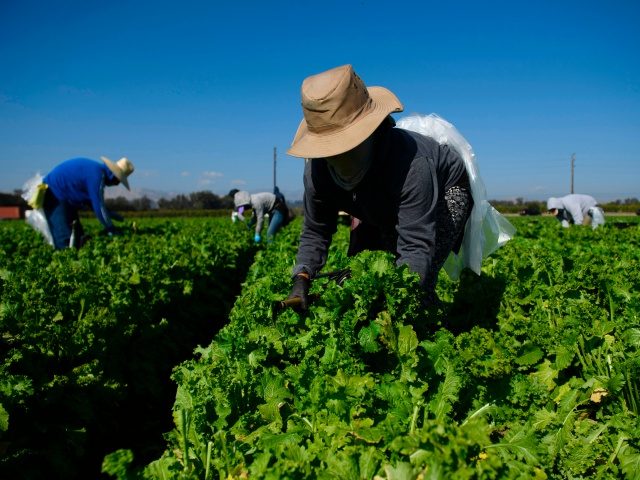 |
| PATRICK T. FALLON/AFP via Getty Images |
Black Americans who spent most of their lives working on Mississippi farms are suing their former employer after they were replaced by foreign workers on the H-2A visa program.
The lawsuit, filed in the United States District Court for the Northern District of Mississippi, accuses Pitts Farms of laying off a number of black Americans, only to replace them with foreign visa workers from South Africa.
The H-2A visa program allows U.S. farms to annually outsource an unlimited number of American jobs to foreign workers who can extend their stay for up to three years. The foreign families of H-2A visa workers can also come to the U.S. on H-4 visas.
In 1997, a little more than 16,000 foreign visa workers were imported to take American jobs on U.S. farms. By 2020, that number has ballooned to a record 213,400 foreign visa workers — an increase in the H-2A visa program of more than 1,200 percent in less than 25 years.
Data shows U.S. farms use the H-2A visa program to import cheaper, foreign visa workers. --->READ MORE HEREBlack Farmworkers Say They Lost Jobs to Foreigners Who Were Paid More
Longtime field laborers in the Mississippi Delta said in a lawsuit that they were asked to train white guest workers from South Africa before losing their jobs to them.
For more than a quarter-century, Richard Strong worked the fertile farmland of the Mississippi Delta, just as his father and his grandfather did, a family lineage of punishing labor and meager earnings that stretched back to his enslaved ancestors brought from Africa.
He tilled the soil, fertilized crops and irrigated the fields, nurturing an annual bounty of cotton, soybeans and corn for a prominent farming family. “I’ve been around farming all my life,” Mr. Strong said. “It’s all we knew.”
Black families with deep connections to the Delta have historically been the ones to perform fieldwork. That began to change about a decade ago, when the first of dozens of young, white workers flew in from South Africa on special guest worker visas. Mr. Strong and his co-workers trained the men, who by last year were being lured across the globe with wages of more than $11 an hour, compared with the $7.25 an hour that Mr. Strong and other Black local workers were paid.
Growers brought in more South Africans with each passing year, and they are now employed at more than 100 farms across the Delta. Mr. Strong, 50, and several other longtime workers said they were told their services were no longer needed.
“I never did imagine that it would come to the point where they would be hiring foreigners, instead of people like me,” Mr. Strong said. --->READ MORE HERE
If you like what you see, please "Like" us on Facebook either here or here. Please follow us on Twitter here.


No comments:
Post a Comment